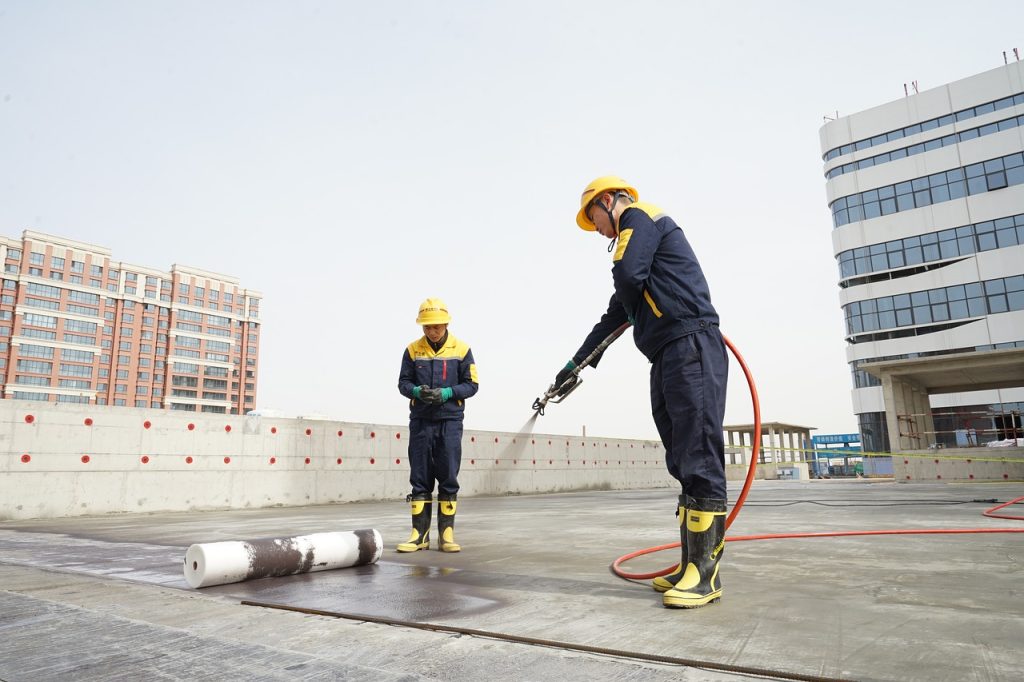
Damp Proofing is a process of ensuring that no moisture or damp gets into a structure’s walls, floors and even foundations. The primary purpose is to refuse the water vapor or moisture but not the under pressure water. This process is mainly applied in regions that have little contact with water, such as residential basements or ground floors. Damp proofing prepares an impenetrable that prevents penetration of moisture from the ground or any surrounding air into the structure. When it comes to protecting your property from moisture or water damage, understanding the difference between Damp proofing and waterproofing is essential. Both techniques serve to keep buildings dry, but they address different types of water-related issues and are suitable for different situations. Here’s a detailed comparison to help you decide which solution fits your needs.
Comparison Table: Damp Proofing vs Waterproofing
| Aspect | Damp Proofing | Waterproofing |
|---|---|---|
| Definition | Prevents moisture but not water under pressure. | Prevents all water ingress, including under pressure. |
| Purpose | To resist moisture penetration. | To make surfaces completely water-tight. |
| Materials Used | Bitumen, asphalt, cementitious coatings. | Membranes, liquid-applied coatings, sealants. |
| Effectiveness | Limited to moisture and minor dampness. | Effective against both moisture and water pressure. |
| Applications | Walls, foundations in low-water areas. | Roofs, basements, swimming pools, tunnels, etc. |
| Durability | Moderate; not suited for high water exposure. | High; withstands long-term water exposure. |
| Cost | Generally less expensive. | Relatively more expensive. |
Key Differences in Water Resistance
Damp proofing When talking about damp proofing, it means in context to the U.S. construction the process of preventing wall, floor or any other construction material from being penetrated through by moisture. Base on the characteristics, applied widely in the new or old residential and commercial building to solve the problem of rising damp, condensation and moisture ingress. Damp proofing forms a wall that prevents moisture from the ground hence enhancing the buildings’ sturdiness and combating diseases like mold and mildews.
Understanding Damp Proofing and its importance
1.Prevents Structural Damage: Prevents wall and foundation degradation due to exposure to moisture for a long period, resulting to formation of cracks, crumbling plaster and wooden structure.
2.Reduces Health Risks: Since the areas get damp, there is growth of mold and mildew on the walls, floor and other surfaces which may cause respiratory problems and allergies among the occupants. This risk is managed by damp proofing.
3.Improves Indoor Air Quality: It prevents their interiors from getting spoilt with foul smell and high humidity as well.
4.Enhances Property Value: Having a good damp-proofing system implies that construction requires minimal repair and also the property’s value is constant.
5.Cost Savings: Cessation of dampness saves future expenses of repairs and redevelopment of the non – living parts of the building and its surroundings together with the internal fittings and decorations
Waterproofing is a construction process that aims at making a structure to be resistant to water or even a mechanical process at preventing the penetration of the water in a structure. This is important in preventing actualisation of water damage which may be as a result of rain water, under ground water, or any water which find itsway into the building. Waterproofing sets up a shield which avoids or even reduce penetration of water onto walls, roofs, basements, foundations, or other parts that are affected by water.
Understanding waterproofing and its importance
1.Protects Structural Integrity: Reduces the occurrence of water related problems including cracks, rust and scaling in concrete or steel bars.
2.Prevents Mold and Mildew: M inimizes the probabilities of health risks that comes with damp conditions and fungi.
3.Enhances Property Value: More than that, a waterproofed structure would have lesser cases of damage that would need repairs and hence a property that is waterproofed is better sold to customers. Reduces
4.Maintenance Costs: Helps prevent water from seeping in hence reducing the regular expenses for repair.
5.Energy Efficiency: Guards against thermal loss because of damp walls and this helps cut down expenses on heating and Costs.
Sunshine Pest Control providing Damp Proofing And Waterproofing Services For Different Areas
Damp proofing and waterproofing are some of the critical services that have to be provided in order to ensure that buildings are protected from moisture that is common in some areas or climates. We are the leading Pest Control Sunshine which offers specials solutions to safeguard your property from damp problems in Mohali, Baddi, Nalagarh, Ambala, Patiala, Kharar, New Chandigarh, Panchkula & Kurali. Within damp proofing we offer services related to building protection from rising damp and ways of managing condensation such as chemical damp proofing, damp-proof membranes, and surface treatments. In the same way, many of our waterproofing services provide customized solutions for the protection against water penetration in basements, roofs, terraces, and walls through the use of liquid-applied membranes, polyurethane coatings, as well as sheet membranes.
These services not only stop damages to the structures but also protect against growth of molds that are bad for health and indoor atmosphere. The requirement may be foundation waterproofing, terrace waterproofing, or wall damp proofing – Our professional team guarantees statutory and quality solutions to address building protection concerns systematically. When you hire Pest Control Sunshine you get quality services that are aggressive in approaches, and quality materials. Allow us to increase the durability of your building and preserve it added value at these strategic areas. Please visit our website to find out all the services we offer and to make an appointment.
FAQ About Damp Proofing and Waterproofing Services
1. What is the difference between damp proofing and waterproofing?
- Damp proofing is designed to prevent moisture from passing through walls or floors caused by rising damp or condensation.
- Waterproofing provides a barrier against water under pressure, such as rainwater, groundwater, or leaks, and is ideal for basements, terraces, and roofs.
2. Why are damp proofing and waterproofing important?
These services protect your property from structural damage, mold growth, and aesthetic deterioration. Proper moisture control extends the life of buildings, reduces maintenance costs, and ensures healthier indoor environments.
3. What are the common signs that I need damp proofing or waterproofing?
- Damp Proofing Needs: Peeling paint, wet patches on walls, salt deposits, or musty smells.
- Waterproofing Needs: Visible leaks, water pooling, cracks in foundations, or damp basements.
4. What are the main methods used for damp proofing?
- Damp Proof Course (DPC): Horizontal barriers to block rising damp.
- Chemical Damp Proofing: Water-repellent injections into walls.
- Surface Coatings: Protective layers applied to external walls.
5. What are the key waterproofing methods?
- Cementitious Waterproofing: Cement-based coatings for water tanks and bathrooms.
- Liquid Membranes: Flexible coatings for roofs and terraces.
- Bituminous Waterproofing: Bitumen-based layers for walls and roofs.
- Sheet Membranes: Pre-formed barriers for basements and foundations.
6. How long do damp proofing and waterproofing solutions last?
The lifespan depends on the method and material used. High-quality solutions can last 10–25 years, provided they are installed and maintained correctly.
7. Can damp proofing or waterproofing fix existing water damage?
These services can stop ongoing moisture problems and prevent future issues, but they do not repair existing structural damage. You may need additional repairs for severe damage.
8. How much do damp proofing and waterproofing services cost?
Costs vary depending on the method, materials, and area size. It is best to consult a professional for an accurate estimate.
9. Are these services environmentally friendly?
Many modern damp proofing and waterproofing materials are eco-friendly, with low environmental impact. Ask your service provider about sustainable options.
10. How can I find reliable damp proofing and waterproofing services near me?
Look for licensed and experienced service providers, such as Pest Control Sunshine, and check reviews, warranties, and service guarantees. They serve locations like Mohali, Baddi, Nalagarh, Ambala, Patiala, Kharar, New Chandigarh, Panchkula, and Kurali.


